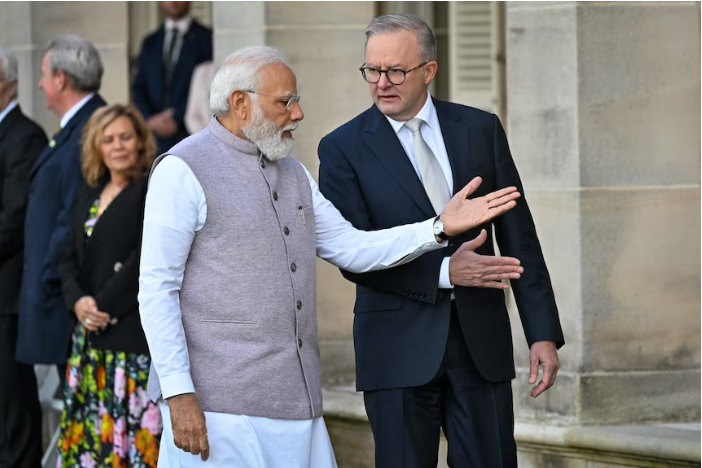
When he touched down in Sydney this week, India’s prime minister received a welcome fit for a rock star.
But when Anthony Albanese jokingly referred to Narendra Modi as “the boss”, there’s a good chance the comparison to US rock legend Bruce Springsteen may have been lost on the visiting leader’s 20,000 rapturous fans.
“Most Indians in the audience there or in India would not actually connect Bruce Springsteen to ‘the boss’ moniker,” said Pradeep Taneja, a senior lecturer in international relations at Melbourne University.
“I think in India it’s being taken literally as meaning that Prime Minister Albanese of Australia was saying that Modi is actually ‘the boss’.”
But for many Indians, including those in the diaspora, their prime minister does retain a kind of cult-like status.
With an approval rating nudging 80 per cent, it’s little surprise that the leader of India’s Bharatiya Janata Party (BJP) is tipped to easily win a third successive term at next year’s national elections.
But beneath a level of popularity most world leaders could only dream of lies a more complex and divisive figure.
In the years since he took power in 2014, India under Modi has seen a massive slide in almost all democratic indicators, comparable only to that witnessed under the repressive policies of Indira Gandhi in the 1970s.
“Many Indians, particularly in academia and media, would tell you that there has been an erosion of civil liberties since he came to office,” Dr Taneja told the Australian View reporter.

“That’s something which has been witnessed in terms of raids on media organisations… raids against think tanks, so there certainly is controversy around him,” he said.
Criticisms of Modi centre around his particularly strident form of Hindu nationalism — or Hindutva — which has been condemned for fuelling ethnic tensions, leading to an uptick in Muslim persecution.
In particular, Modi’s response to 2002 riots in the state of Gujarat, at a time when he was the state’s chief minister, remains controversial more than two decades on. His detractors accuse him of not doing enough to stop the violence which resulted in more than 1,000 dead, mostly Muslims.
Even in Australia, protests dogged Modi’s visit, with posters calling for his arrest, accusing him of being a “Hindu terrorist”.
But despite being questioned about it on at least two occasions, Albanese refused to engage with criticisms of the Indian leader.
“It’s not up to me to pass a comment …(but) India, as a democracy, has a range of views which is a good thing,” he told Channel Seven’s David Koch before fending off a similar question from the ABC’s Michael Rowland by pointing out that India is “the world’s largest democracy”.
It’s an approach which comes as no surprise to Dr Taneja who says India’s strategic economic significance will make Western countries reluctant to question Modi’s human rights record.
He points to Australia’s history of prioritising economic considerations above human rights concerns.
“In the 1980s when China emerged as a major market for Australian commodities, Australia ignored human rights violations in China and engaged in economic and trade partnerships with China,” he said.
“But India is a far more open as a political system than China has ever been, and we had no problem dealing with China.”
India’s increasing economic clout does, Dr Taneja believes, give Modi particular power in international circles, particularly with the United States.
“India can defy criticism when it comes to erosion of civil liberties in India, because the government of India knows that India has become almost indispensable to the United States,” he said.
The reason India is becoming increasingly essential to the US — and by extension, Australia — comes down to one word: China.
China’s ascendance in the region has become particularly concerning for western countries in recent years as tensions in the South China Sea and Taiwan strait intensify.
“When we look at the United States, the European Union and Australia, when it comes to dealing with the challenge of China, I don’t think they have a choice,” Dr Taneja said.
“There is no other country in the Indo-Pacific with the heft of India, with the size of India, with the population of India, and with the economic potential of India.”



